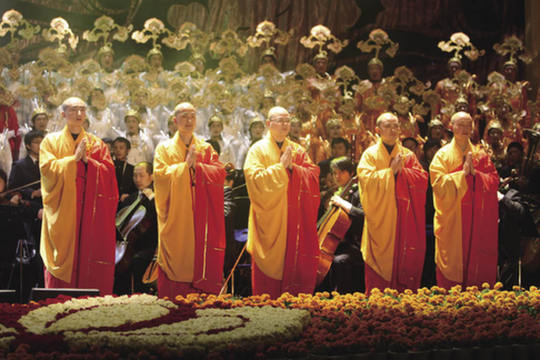During its 2,000 years in China, Buddhism has absorbed Chinese culture and influenced the Chinese way of life. Today this foreign-born religion is a constituent of traditional Chinese culture as well as a lifestyle.
Buddhism in China
By staff reporter ZHANG XUEYING
ON the morning of March 11, 2009, numerous pilgrims swarmed into a silent hutong near the famous Houhai scenic spot in Beijing. The Guanghua Temple is located here, where Buddhists congregate on the 1st and 15th of each month of the lunar calendar. On these special days, temples hold religious rites for pilgrims. March 11th (the 15th day of the second moon) was the Buddhist day of nirvana. “We didn’t anticipate that so many people would come. We have prepared twice as much vegetarian food as before, but that still can’t meet demand,” commented a temple chef.
Four days later was the birthday of Guanyin, the Goddess of Mercy. During this festival, the number of tourists to Mount Putuo – a Buddhist mecca in Zhejiang Province – increased by 20 percent compared to the same period last year. Figures from the local tourism administration show that in the first two months of this year tourist revenue brought in by pilgrims grew by 45 percent over the same period last year.
In 2005, Prof. Liu Zhongyu from the Research Center for Religious Culture, East China Normal University, held a survey on Chinese religious beliefs. Five thousand questionnaires were distributed to residents aged over 16 in 31 provinces and autonomous regions. Thirty percent of the 4,500 valid answer sheets showed clear religious belief. Buddhists were the biggest proportion of believers, accounting for 33.1 percent. Liu Zhongyu explains: “Buddhism is the major belief among intellectuals and young people.” According to the State Bureau of Religious Affairs, the number of Buddhists in China was 100 million in 1997. Liu Zhongyu believes it has now surpassed 300 million.
Buddhism’s revival in China is evident in the restoration of many temples in recent years. The 1,000-year-old Famen Temple in Shaanxi Province, the Yuquan Temple built 600 years ago in Hunan Province, and the Baoxiang Temple in Shandong Province are all under reconstruction. What’s more, the world’s tallest statue of Buddha and the world’s tallest statue of sitting Maitreya have been built in Henan Province and Zhejiang Province respectively. At the end of March, the World Buddhist Forum was held in a newly built Buddhist temple in Wuxi, Jiangsu Province, attracting more than 1,000 Buddhist dignitaries from 37 countries and regions.
“In the past, people thought the Chinese were rather pragmatic in their religious beliefs,” Prof. Liu states, “but the survey indicates we’re chasing spiritual satisfaction through religion.”
 |
|
The second World Buddhist Forum opens in Wuxi, Jiangsu Province, on March 28, 2009. |
Turning to Spiritual Conciliation
China’s economy is growing at an unprecedented high speed. Everybody is trying to show his or her prowess by making a fortune. The new era has brought opportunities but also heavy pressures. “All corners of society are rife with superficiality and impatience,” claims Zhou Xiaozheng, sociology professor at Renmin University of China. “The elites and young people are especially eager for quick success and instantaneous gains.”
According to Prof. Zhou, modern Chinese society has been greatly impacted by three significant changes: the shift from a planned to market economy; the huge numbers of farmers swarming into cities to become migrant workers; and a formerly quiet life being replaced by risk and competition. According to Zhou, any one of these changes may have led to psychological imbalances. “People used to go through tribulations together. But now they have to accept the widening gaps between different groups of people.” The Hurun 2009 Wealth Report revealed that the number of multimillionaires in China has reached 800,000.
| 